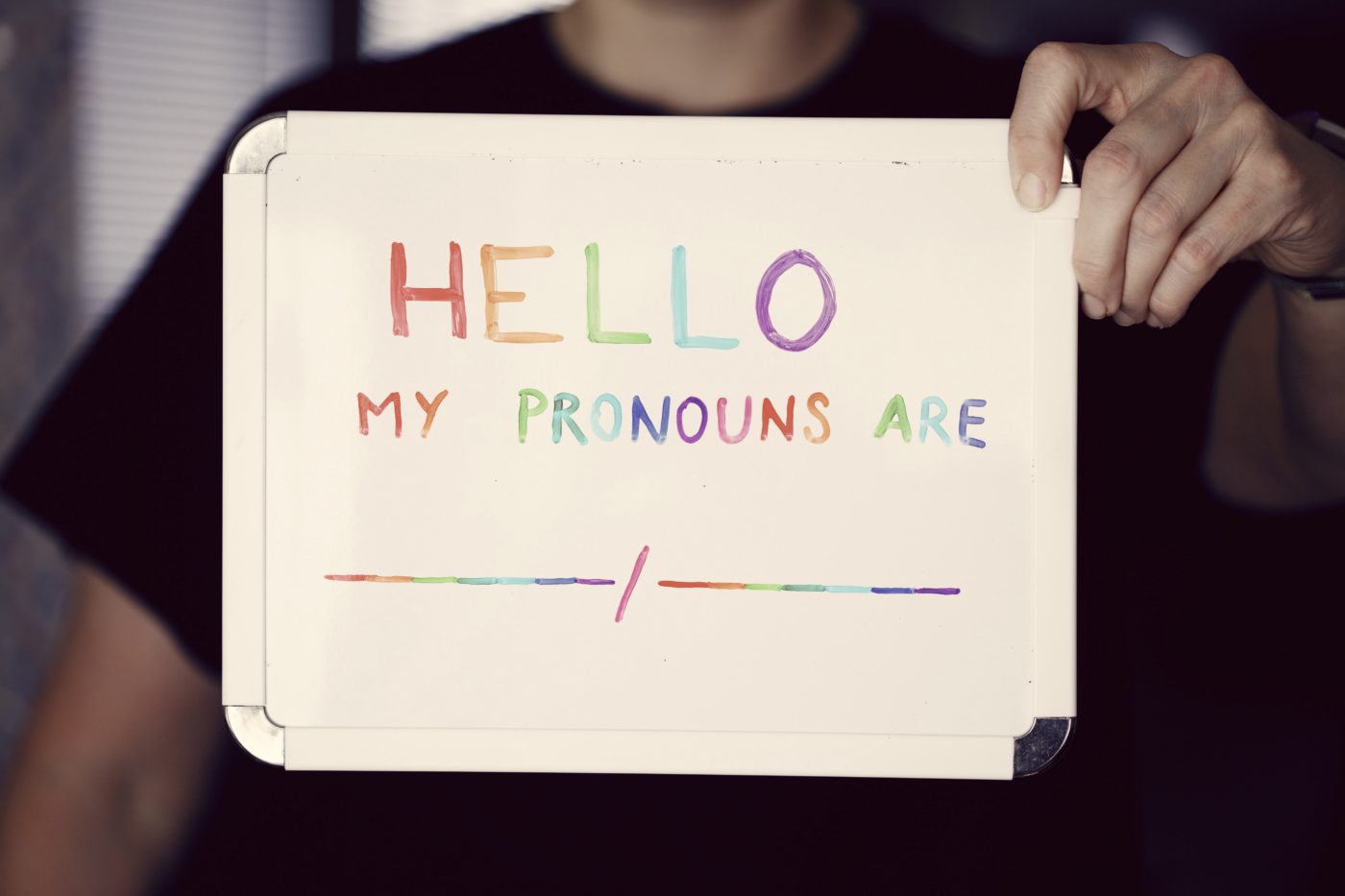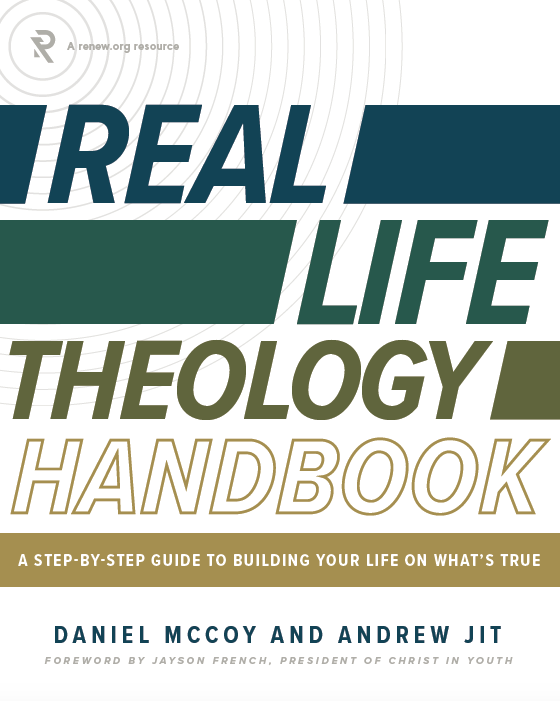
The Remarkable Power of Preferred Pronouns
I told myself I wouldn’t brag about this publicly. For years, it’s been a bit of a Clark Kent-Superman dilemma: should I tell people about my secret power? Should I keep it under wraps? At the risk of sounding vain, I’m going to go ahead and tell you.
I know a lot about pronouns.
Like, a lot. When it comes to pronoun mastery, I might be in a percentage-of-a-percent kind of percentile. As a former grammar/writing teacher, in seconds I could scrawl out a white board chart of every personal pronoun in its nominative, objective, and possessive form. What makes a pronoun who or whom, whoever or whomever? I’m glad you asked. Demonstrative pronouns. Interrogative pronouns. Relative pronouns. Exciting!!! (For those who actually are excited about such things, I am trying to joke here.)
And when it came to those elusive indefinite pronouns? I could rattle off the list of plurals and the list of singulars and the ones that function as either singular or plural. If you’re curious which indefinite pronouns function as singular OR plural (Who am I kidding? Of course you’re interested!), the acronym misspells the word “salmon”: Some. Any. None. All. Most.
What the Who?!
Yet I can honestly tell you that, of the dozens of students to whom I taught pronouns (it’s “whom” because it’s the object of a preposition), no student—and I mean no one—ever registered any interest. Maybe the glazed eyes and rolled eyes and closed eyes were concealing a deeper enthusiasm for pronouns from the students underneath. But no, I’m pretty confident that, although I tried, pronouns for my students remained profoundly boring.
So imagine my shock when, in the last few years, of all things, pronouns are—making the news?! Middle school’s biggest nerd has grown up to become talk of the tabloids? What?!
Yet, that’s precisely what’s happened. Of all the parts of speech, pronouns have passed up adjectives, adverbs, nouns, conjunctions. Verbs are lagging behind—as pronouns are now where all the action is. Pronouns have even surpassed interjections as all the rage.
“Imagine my shock when, in the last few years, of all things, pronouns are—making the news?!”
A sampling of headlines: Biologically male musician comes out as transgender woman and uses the pronouns she/her/hers. Person coming out as nonbinary can use the pronouns they/them/theirs. Person coming out as gender neutral can use the pronouns xe/xem/xyrs. Human identifying with fairyhood can use the pronouns fai/fairy/fair. Human identifying with demonhood can use the pronouns dem/demon/demons. Human identifying with cathood can use cat/cats/cats as pronouns or use a cat emoji with suffixes as pronouns. Mandalorian star Gina Carano jokingly used boop/bop/beep as her pronouns on social media—and was swiftly canceled by Disney.
New and Preferred
These custom designations have become known as people’s “preferred pronouns”—although if you use that phrase, you might well get corrected by someone telling you to drop the “preferred” since they’re simply “your pronouns.”
Another related term is “neopronoun” (“new pronoun”) which Ezra Marcus at the New York Times describes as “a word created to serve as a pronoun without expressing gender” (e.g., ze/zir/zirs). Or, as Marcus explains, your neopronoun can bring in an already existing noun (a “noun-self pronoun”) that fits your sense of self. Some of the examples the Times gives include animals (e.g., bun/bunself, kitten/kittenself) as well as fantasy creatures (e.g., vamp/vampself, prin/cess/princseself). Are some people being more playful with their neopronouns than anything else? Possibly, the article answers—but hastens to add, “Many neopronoun users are dead serious.”
Reflecting on Preferred Pronouns as a Christian
As Christians, it’s good for us to reflect on how our faith teaches us to respond to cultural trends. When it comes to this trend—of people, regardless of their species or biological sex, picking a different pronoun that best matches their sense of self—how should Christians respond?
The big debate so far between Christians—at least between those Christians like myself who believe that our identity is rooted in our createdness, not in our subjective sense of self—has been whether or not we should use a person’s preferred pronouns.
- On one side, there are Christians who are very uncomfortable with going along with the idea that we give ourselves our own identities, and thus they won’t be using people’s preferred pronouns—even if they might suggest using creativity (e.g., not using pronouns at all when describing the person) in order not to unnecessarily offend.
- On the other side, there are Christians who are also uncomfortable with going along with it—but, out of a desire to build bridges, especially with non-Christians, they will go ahead and use a person’s chosen pronouns.
If you want to look at a clear-minded, kind-hearted Christian look at transgender issues in general, I highly recommend this article. As you’ll see, both authors have a friendly disagreement on this question of whether to use a person’s preferred pronouns, and you’ll see a helpful wrestling with the question from two Christian angles.
“As Christians, it’s good for us to reflect on how our faith teaches us to respond to cultural trends.”
My goal in this article isn’t to enter that particular debate, as important as it is. My goal instead is to make a modest point about the power of preferred pronouns. I’m amazed at the remarkable power unleashed by whoever came up with the idea (here, it’s “whoever” not “whomever,” because “whoever” is acting as subject of a clause).
Remarkable Power
In order to tell you what I’ve discovered about the power of preferred pronouns, I’ve got to tell you one more remarkable fact about myself: When I’m not wowing people with my knowledge of pronouns, I’ve got another backup subject of interest that makes me the life of parties, hypothetically, if I were to be invited to some. (I’m kidding.)
Here it is: I study philosophy. Hold on to your hat, folks!
Real quick, I’ve got to tell you about a school of philosophy. It’s called existentialism. What’s “existentialism”? It’s the idea that my existence comes before my essence. What?? In other words, that I am (my existence) comes before what I am (my essence). Come again? Okay, here it is in plain English: If I’m an existentialist, I believe that I can create my own reality. I wasn’t born into a world in which truth was already set in stone and I have to live according to “the truth.” Rather, I get to create my own truth.
“If I’m an existentialist, I believe that I can create my own reality.”
Are you ready for the remarkable power of preferred pronouns? Here it is: Preferred pronouns turn us all into existentialists.
I want you to notice something subtle but significant about preferred pronouns. If I use someone’s preferred pronouns, I don’t use them in conversation with the person. Sure, I might call someone a Mr. or a Ms. in conversation, but those are honorifics, not pronouns. The only personal pronoun I’ll direct to a particular person in conversation is “you.” However the person identifies, I will call the person “you” in conversation.
Using a person’s preferred pronouns means I’m using those pronouns in conversation with another person. Xe is on vacation this week. I’m about to have a conversation with dem. Isn’t this xyrs birthday? Thus, using preferred pronouns isn’t nearly as much about showing a person a gesture of kindness. It’s way more about interacting with another person in a way that shows you’ve both philosophically accepted the other person’s subjective view of reality.
There are a thousand philosophies out there to choose from. Preferred pronouns have the potency to instantly convert millions—without them knowing—into a single philosophy: the school of existentialism. That’s power.









